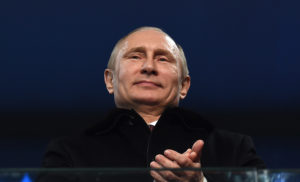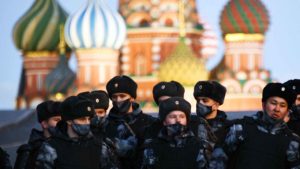For two decades Roman Abramovich embodied the ambiguity and vulgarity of London’s ties with the Russian élite. In a sense, he was Vladmir Putin’s unofficial, silent, constant ambassador to the city. The one Russian other than the President that anybody could recognise.
To impress the English you must be overly kind to dogs and horses, extremely wealthy, or gushingly enthusiastic about football. Abramovich was at least two of these. Previously unknown outside of Russia, his purchase of Chelsea FC in 2003 made him England’s favourite oligarch.
He stood for all the others. Like them, Abramovich bought Francis Bacons, yachts, and football clubs. He was expensively divorced. He purchased a Kensington townhouse for 90 million pounds, then plotted grandiose subterranean extensions to it. His security detail were told they were not allowed to bring firearms into the West London private schools his shoal of children swam through. His weirdly thin background, like his face, was enigmatic. His trajectory — from penniless orphan, to middling rubber duck salesman, to billionaire tycoon — mirrored the unlikely CVs and fluke-strewn ascents of so many mega-wealthy products of Russia’s insane Nineties. Unlike Abramovich though, many of his old rivals and partners from that time met… abnormal ends.
But so what? Abramovich entered London high society when views of Putin’s Russia were charged with hopeless optimism. Putin, wrote Neal Acheson in 2004, was an “agent of sweeping change”. His reforms might one day make “a relatively law-abiding and governable Russia” a fact, rather than a dream. In the academy, favourable verdicts (grandly blessed by Perry Anderson in 2015) rained down on Russia. It was a vibrant, investor-friendly middle-income country; it was a respectable member of OECD; it was less statist in its control of energy markets than Brazil! Abramovich then, was an envoy from a developing country, not a one-man image-softening operation sent from an anguished, ramshackle, authoritarian state, still held together and animated by the most salient, deathless force in Russian political history — imperial ambition.
These wonky arguments added a watery academic gloss to London’s embrace of Russians like Abramovich. Ever since John Major’s Conservatives introduced ‘Golden Visas’ that fished for millionaire investors in the Nineties, every British government, and London Mayors Johnson and Livingstone, had courted Russian money. A butler class formed to enthusiastically count the cash.
Behind the biscuit tin version of London — Union Jacks on the Mall, Notting Hill selfies, and recumbent deer in Richmond Park — was a bleaker reality. To arrive here from Russia was to find networks of bankers, estate agents, accountants, wealth managers, PR flacks, politicians, and a legal system all eager to take your money, over-educate your children, Harley Street your wife, Isle of Man your taxes, gag journalists, and angelify your reputation.
None of them cared where the money came from. London could bury your secrets for you. “This country’s nothing but an off-shore laundry”, spits Logan Roy in Succession, “for turning evil into hard currency.”
That quiet part was rarely said out loud. The English are a discreet and sentimental people after all. In 2005, Ken Livingstone, at a Westminster address to 1,200 Russian political and business leaders, invoked the “warmth and sympathy” the English felt for their old wartime ally against Hitler. Sympathy was a sound basis for deal-making: “Russians,” he said, “are welcome in this city, both as individuals and for the business that they bring.” Since 1998, according to anti-money laundering groups, around a hundred billion pounds of Russian money has washed through London, and into property and commodities. The welcome was accepted.
If Livingstone represented the grasping yet oddly dewy-eyed side of Londongrad’s rise, his successor articulated the jokey cynicism the English felt towards the oligarchs. Boris Johnson was just as enthusiastic about Russian money as Livingstone, but prepared to laugh — like so many other toff-adjacent Brits — at Russian vulgarity too. In 2012 he urged oligarchs to flood London’s courts with libel actions. “If one oligarch feels defamed by another oligarch, it is London’s lawyers who apply the necessary balm to the ego,” he told the CBI’s annual conference that year. “I have no shame in saying to the injured spouses of the world’s billionaires: if you want to take him to the cleaners, take him to the cleaners in London…”
It was like a joke. Except the estranged wives and litigious oligarchs were components of Putin’s increasingly despotic regime. The key figures of Russian state capitalism, who were now building nests in London, had begun the 2000s calling the President Mr Putin. Then they called him Boss. Then — another joke, at least to begin with — Tsar. Abramovich found ways to deal with Putin. Against a backdrop where oligarchs were assassinated, exiled and imprisoned, the Chelsea owner did everything he could in order to keep himself safe.
The pair were close. Just how close was revealed by Abramovich’s successful defence of a landmark high court claim brought by his fellow oligarch and mentor Boris Berezovsky in 2012. “Mr Abramovich enjoyed very good relations with President Putin and others in power at the Kremlin,” the judgement recorded. “It was also clear that Mr Abramovich had privileged access to President Putin, in the sense that he could arrange meetings and discuss matters with him.”
That somebody who had folded so neatly into the scrim of English life — celebrated on Stamford Bridge’s terraces to the tune of the Only Fools And Horses theme, lunching on his yacht with Sir Paul McCartney — was so close to a despot ought to have caused alarm. The press preferred to write about his fleet of supercars, his record-breaking transfer deals, and a floated West End musical about Abramovich’s life. The Premier League’s attitude was summed up by its then chief executive, Richard Scudamore: “Football is not a business but a sport dependent on… speculation… there’ll always be rich men ready to pour more money into clubs just to be part of the game.”
Abramovich was not on equal terms with Putin, even as he became lauded in London. He was a boyar to Putin’s Tsar. “I don’t think there is a percent of independence in him”, said one analyst who knew Abramovich in the Nineties. He was just like the others. The oligarchs’ power and privilege was theoretical, and utterly dependent on Putin. He could ruin them on a whim, as he did to Boris Berezovsky soon after he came to power. The truth was that the oligarchs were more like hostages than independent actors, more like courtiers than policy-makers, and more driven by venality than belief. Putin made them dependents, and walked them over a plank with a very deep drop.
Perhaps English politicians such as Johnson and Livingstone thought men like Abramovich could be moderated by the West, and could help to remake Russia in its image, as the academics thought was already happening. None chose to see the umbilical cords that ran back to the Kremlin. As the 2000s passed into the 2010s, it looked like the West was becoming as corrupt and irrational and nihilistic as Russia, rather than bringing Russia in line with its rules based system. “It was as if a virus,” wrote Catherine Belton in Putin’s People, “was being injected into it.”
Now the virus is burning itself out. Two weeks of war have forced British politicians to shift 30 years of oligarch-tickling policy. They would no longer be able to take whatever they wanted. Abramovich has been hit with sanctions ranging from asset freezes to travel bans. Johnson says there will be no “safe havens” for Putin allies, not even in London’s courts. Yesterday’s West End final edition of the Evening Standard: “ROMAN’S EMPIRE IN RUINS.” Discarded copies, with crumpled Abramovich faces staring blankly out from them drifted through Berkeley Square.
Given his wealth and notoriety, Abramovich barely left a paw print on English life. Yes, he increased the bank balance of butler class functionaries; yes he will most probably leave Chelsea, his plaything and ornament, tarnished. But his wallflower shyness and refusal to be interviewed make him a ghost. Just as he reportedly moved through his A-List New Years Eve parties on St Barts barely saying anything, Abramovich’s time in England will be defined by his silences not his actions. He will not be ruined though. So much of his wealth is stored off-shore in secret bank accounts that there will always be a fallback for him.
Londongrad will be rebranded, and its lackeys will find new clients. Money from Saudi Arabia, Azerbaijan, Kazakhstan, Nigeria, and above all China will need to be laundered. Their tycoons will need crisis PR. Their powerful urges to litigate against each other will need to be satiated. Other Romans are here already. They keep buying football clubs. Not even war will break London’s filthy habits.
Disclaimer
Some of the posts we share are controversial and we do not necessarily agree with them in the whole extend. Sometimes we agree with the content or part of it but we do not agree with the narration or language. Nevertheless we find them somehow interesting, valuable and/or informative or we share them, because we strongly believe in freedom of speech, free press and journalism. We strongly encourage you to have a critical approach to all the content, do your own research and analysis to build your own opinion.
We would be glad to have your feedback.
Source: UnHerd Read the original article here: https://unherd.com




